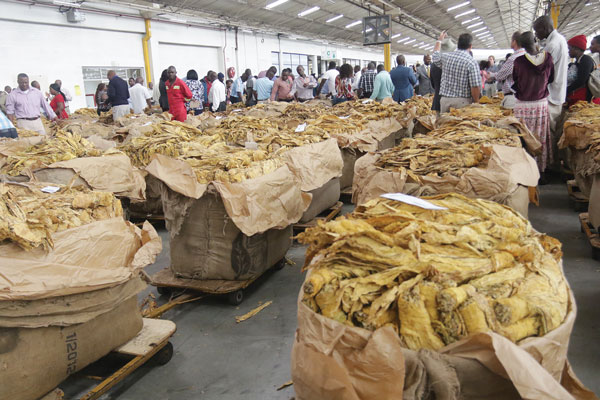
AS COVID-19 continues to rear its ugly head globally and locally, stakeholders in the tobacco industry have proposed an operational framework to use during the tobacco marketing season tentatively set for next Wednesday.
BY FIDELITY MHLANGA
The proposed safety measures include minimising the number of growers to 20 on the buying arena, provision of toll free phone numbers for booking at all selling points and restricting sales to one person per grower number, NewsDay Business has established.
The Tobacco Industry and Marketing Board (TIMB) is expected to enforce the “deliver today and sell tomorrow” policy, with each batch set to have a maximum of 20 farmers to be allowed to complete its sale before the next one.
According to a Tobacco Industry Operational Guidance on COVID-19 proposal gleaned by this publication and awaiting approval by Agriculture minister Perrance Shiri, the cash shall be made available to farmers with banks mandated to restrict the number of clients being served per time.
Unlike the previous seasons, farmers will be prohibited from sleeping overnight at the selling points, with auction floors directed not to offer over-night accommodation to farmers.
“Non-booked tobacco must not be accepted, farmers bringing such tobacco to the market shall be turned away and prohibited from making a sale. Farmers waiting to conduct their sales shall be broken into smaller groups within the premises to eliminate gathering of large numbers,” the proposal reads.
Continuous disinfection of the premises and site shall be observed before, during and after sales, with all selling points set to be manned by a qualified medical staff on site. Informal traders have been barred from setting up shop at the auction centres as part of measures to enforce social distancing.
- Chamisa under fire over US$120K donation
- Mavhunga puts DeMbare into Chibuku quarterfinals
- Pension funds bet on Cabora Bassa oilfields
- Councils defy govt fire tender directive
Keep Reading
“The industry shall engage the relevant authorities, which include the ZRP [Zimbabwe Republic Police] and local municipality to enforce the closure and removal of flea markets and vendors around the auction and contract floors ahead of the commencement of the 2020 marketing season,” the proposal reads.
In addition, shops holding valid lease agreements with auction floors to trade inside the premises of the auction floors shall be asked to restrict the number of the customers they serve at any given time.
“Tobacco is bought in the absence of the growers who shall come in to review after the sale. Floor marshals shall be deployed by the industry to ensure that rules set by the stakeholders are followed. They shall conduct random checks on gate passes and maintain the permitted number of people in a gathering,” the proposal reads.
All tobacco merchants shall provide a staff roster a week ahead and only essential employees with clearly labelled name tags will be permitted access to the floors.
It will also be optional for growers to attend the sale and in the event that the grower has not attended, the grower representatives shall make decisions on behalf of the absent grower, a scenario which farmers’ unions feel may lead to their members being shortchanged in the process.
Contractors operating decentralised selling points (outside Harare) were advised to encourage their farmers to make use of these facilities.
Guidance on arrival at the selling point prescribes that only essential persons may enter the premises and must have their temperature and IDs checked.
“(There must be) installation of handwashing facilities comprising running water with either an alcohol-based disinfectant or soap by the entrance gates for use before, during and after sales. Restrict participants to active buyers only, non-participating buyers should not be allowed into the premises. No children are allowed into the floor,” the proposal reads.
Auction floors must use a register provided by the merchants to screen essential staff at entry points. On daily basis, a short-time valid gate pass shall be availed to a person who shows no signs of infection.
“The selling or serving of food by the canteen shall be limited to a maximum of 100 people at any given time. The tables shall be widespread apart to maintain the acceptable social distance. The canteen within the premises shall have the handwashing facility available,” the proposal reads.
For those who work in tobacco factories, handwashing facilities should be installed by the entry point and personnel should be checked for fever and abnormal body temperature at the gate.
“Individuals are encouraged to self-isolate after travelling outside the country. Meetings should be minimised and preferably conducted online via Skype or other facilities. The number of people attending a meeting should be reduced to 20 or less. The venues for meetings should be changed to more spacious ones. Other staff members should work from home,” the proposal reads.
Contacted for comment, TIMB board chairperson Patrick Devenish said they were still deliberating on the way forward.
“Sorry no comments yet. We are still deliberating,” he said.
George Seremwe, the Tobacco Association of Zimbabwe president, highlighted the need for extensive awareness on the new measures.
“Considering booking today and sell tomorrow system, farmers always want to be with their bales. Last year we experienced a lot of tobacco theft on the road and floors. Avoiding sleeping overnight is going to be hard, moreso awareness about guidelines has not been done extensively,” he said.
Tobacco is one of the country’s top foreign currency earners and is key in providing liquidity for the importation of key essentials that include fuel, grain and raw materials.











